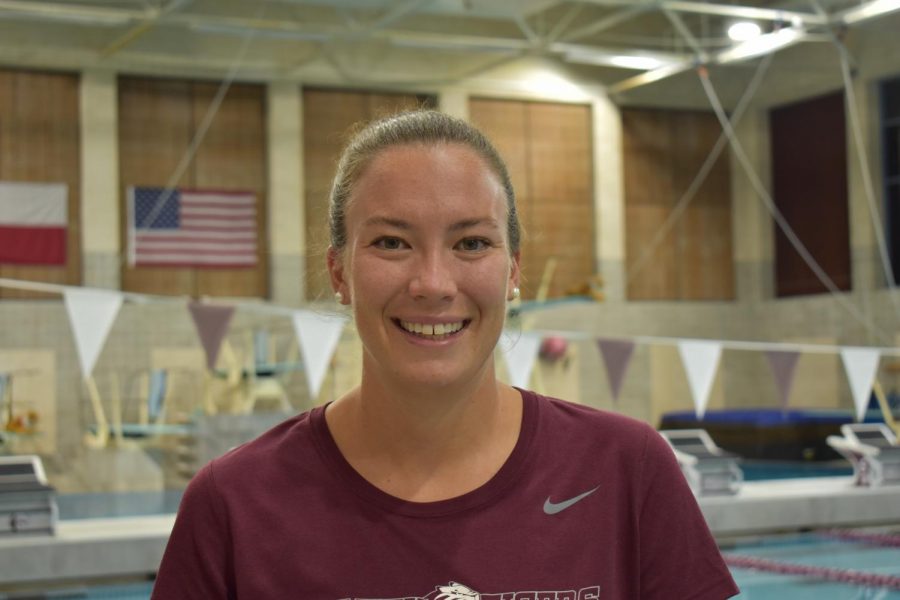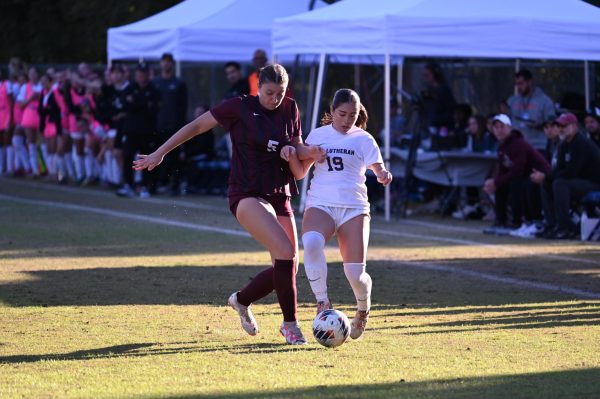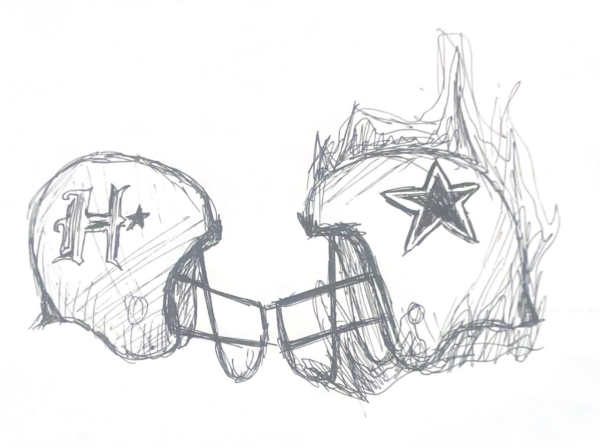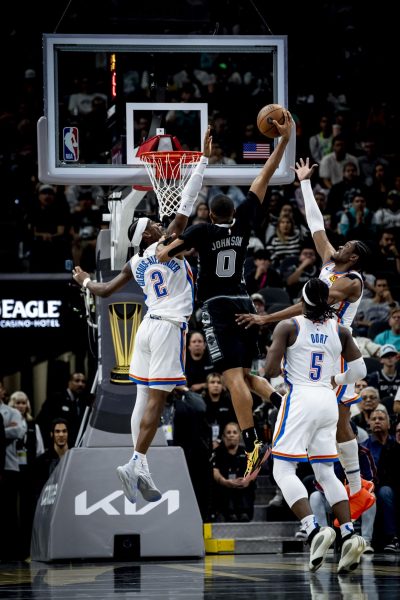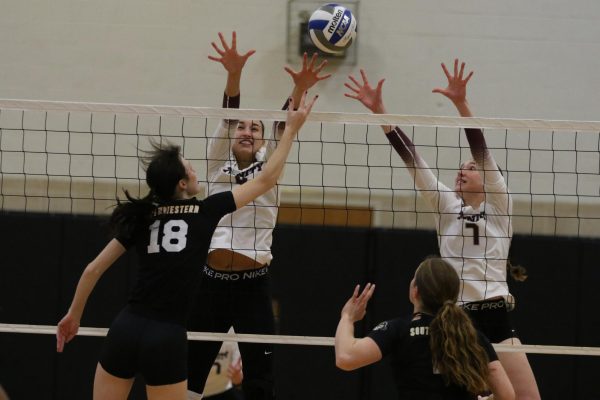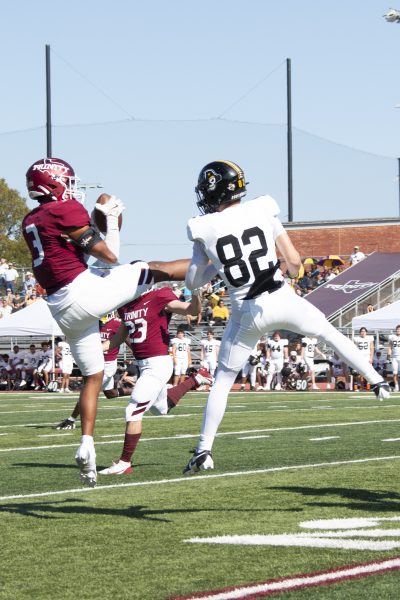Coach’s Corner: Cathleen Pruden
New Head Swimming and Diving Coach makes a splash
Cathleen Pruden joins the Trinity University athletic staff as the head coach of the men’s and women’s swimming & diving teams after five years as an assistant coach at Bowdoin College and Amherst College. Pruden replaces former head coach Stan Randall who led the Tigers for 18 seasons.
The four-time All-American swimmer discussed her hopes for her inaugural season as a Tiger and how her experience has shaped her coaching style in an exclusive interview with the Trinitonian.
What brought about your move to Trinity?
Having spent the last nine years in New England, I certainly don’t mind being somewhere where I didn’t bring my snow shovel, so that’s the nice part. I’ve known for a while that I wanted to be a head coach, and Trinity really checked the boxes for the type of place that I thought I would end up and want to pursue head coaching in terms of being able to pursue academic and athletic excellence — not one at the expense of the other, but really being able to do them both. The team has a history of success at the conference level, [as well as] some history of a presence at the national level, but definitely can do more there, and those are exciting goals for me. It’s a program with the right kind of foundation and the right potential that makes it exciting. I interviewed and did all of that over Zoom, but San Antonio has lived up to what I thought it was, so it helps that it has indeed turned out to be a fun place.
What are you most excited about for the upcoming season?
I’m just excited to get to know this group of athletes and to watch them get to compete after only sort of getting to compete last year. Our first-years and our sophomores are really going through a college season for the first time, so that’s always exciting to watch, and now you’re getting to watch half the team do it all at once. And it’s exciting too. I was familiar with some of these names before I came to Trinity, but to get to know them as people [is cool]. It’s really cool to be like, “Oh, here’s this person who I’ve seen in results before, and now we get to coach them and see what they can do.” I’m always excited by the little things. I’m not a coach that’s motivated by just the conference meet because I can’t get up every day excited about February — because February is really far away. I’m a lot more excited about the day in, day out. Every day we show up here, people can find different things to get better at, and that’s what’s fun to me. Watching things click for individuals. So that’s what I’m excited for, just knowing we get to do that every day.
How did you first know that you wanted to be a coach?
I was an education major and I had said I wanted to be a second-grade teacher, like literally since second grade, and then, fall of my senior year, I realized I did not like being in a classroom as much as my classmates, so I sort of changed my major and dropped my teacher licensure. I took an intro to sport pedagogy class, which I really liked, and I had done summer league coaching. I was doing some swimming media, really all of senior year, and then through that next summer and honestly kind of stumbled into it. I had a mentor who knew that a lot of folks needed a female assistant and she was like, “Would you want to coach?” and I didn’t know her [yet], she was pretty much a stranger so I was like, “Maybe.” So I totally stumbled into it, but I think it made a lot of sense because I have just always loved swimming so much, and I couldn’t function being done with it, so it was a way to keep going in a different capacity. A little bit of an accident, but I think it worked out well. All my education is still super relevant, as far as if I’m going to pick a major to go into coaching, education is a good one.
What is the most important aspect of coaching?
Probably making connections with our athletes and getting to know them, not just for what they can swim. Certainly, in the first week of practice, I was like, “Oh, I’ve had these conversations with you all. I’ve gotten to know you. Now you’re facedown in the pool and now I have to get to know what the back of your head looks like.” That’s its own production, getting to know who they are as a swimmer, but being able to figure out who they are and what else they have going on on campus and in their life and what makes them excited and what makes them motivated and what gives them a hard day is, I think, probably the most important part [of coaching] — is figuring that out. We’re only on week four. I think I can confidently say we’ve made progress with everybody, but by no means are we where we’ll be in February in terms of the relationships we have with athletes.
How does your experience as an athlete tie into your coaching style?
Certainly the experiences I’ve had with all of my coaches my entire life [impact] how I coach. I think I take some little things from some of them, sometimes in behaviors and sayings, and sometimes the set I put forth could be something I’ve done before, so that definitely plays a role. I think probably the biggest role it plays in a lot of ways is just being able to empathize with athletes and what they’re doing — like we did that too, but also to be able to rely on the experiences I’ve had. It’s the little things. Like Saturday, we did an inter-squad meet and someone was like, “I only get a five-minute break here,” and I can sit here right now and think of so many times that I’ve had far less than a five-minute break. And we’re different athletes, sure, but I’m here to tell the tale. You’re gonna survive. We’re not giving you anything you can’t do because we know what people can do, having been swimmers. And it’s the bigger things too, like when we get to Nationals, that’s an environment I’ve been in. I can understand what it feels like to be a senior and be like, “This is my last shot at this, and here are the goals I have,” so I think all of those experiences are, for the most part, ones that I have in common with our swimmers here.
What is something you wished the casual observer knew about swimming and diving?
Probably the casual observer should realize that, ultimately, we have probably some control over every 100th of a second. I think so often it’s like, “Oh my gosh, that person is just so much faster. Look at them. They won,” but [the truth is] that we’re able to come to the pool every day and feel like we can make progress towards closing that gap, and we have control over all these little bits of seconds, and that there are things we can do to improve. I think a lot of times swimming’s viewed as like, “Oh, it’s just this aerobic thing. You just go back and forth, like a runner just goes for 10 miles. You just go for two hours,” but we’re trying to be super engaged [with] all sorts of details that the casual observer would not even see.
Do you have a favorite memory associated with swimming?
When you’re growing up, people are like, “You’ll never remember your times,” and I was like, “That’s so stupid, of course, I will,” but now it kind of freaks me out when I think about it, and I don’t remember exactly, but I used to know that, how do I not know? But it’s a reminder that the things I’m remembering, the things I’m holding on to, are all connected to people. So I think, literally, all of your favorite memories are probably the times that you’re, [for example], stuck in an airport after a meet, and it’s just the hour that you spend hanging out with your teammates. Like, a lot of those things are things that come to mind. Certainly, yes, I can probably pick a favorite race and I can pick those “aha” moments of like, “Wow, I really did [it]. The last year has come together right now in this four-minute swim,” but the more memorable ones are definitely teammate-based.
If you were stranded on an island, who would you want to be stranded with and why?
Okay, we’re on an island. I’ll go with my sister. She’s also a swimmer, like, would we run the risk of maybe not getting on? Yes, absolutely; that’s because we’re related, but I would trust her to decide with me that we could swim off of this island, and we could make it somewhere and, you know, she would chug along with me as well. I would trust her instincts more on what plants [you] would probably eat than I would trust my own, so I think we can make a decent team as long as we are getting along.
What three people, alive or dead, would you invite to your dream dinner party?
Some combination of my aunts and uncles — I mean, there’s kind of four inherently in there, but they are some of my favorite people to go to dinner with. We always have a fun time, and they know their food, and they know their restaurants, so they’re just always very fun to go to a meal with. I haven’t gotten to see them since May, so it would be thrilling to eat dinner with them at any given time.
What would you eat at said dinner party?
I’m a really, really big breakfast person, so I don’t care that it’s dinner. Let’s go to breakfast for dinner.
If you could tell the world one thing, what would you say?
You are more than your performances. Well, for the swimmers, it’s that you are more than your performances in the pool and in the classroom, but I think you are more than your performances in whatever you value as your area of expertise.
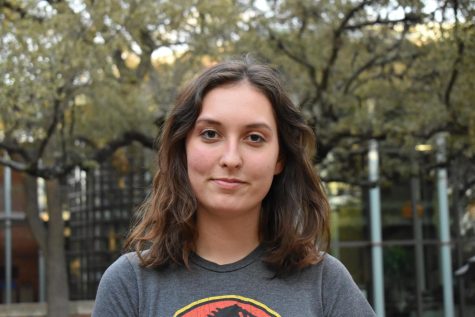
My name is Alejandra, and I'm a senior majoring in Neuroscience. I initially joined the Trinitonian as a first-year and worked my way up from a Sports...

My name is Claire Sammons and I am an Anthropology and Communications double major. I have worked for the Trinitonian since fall of 2020. I became a photographer...

